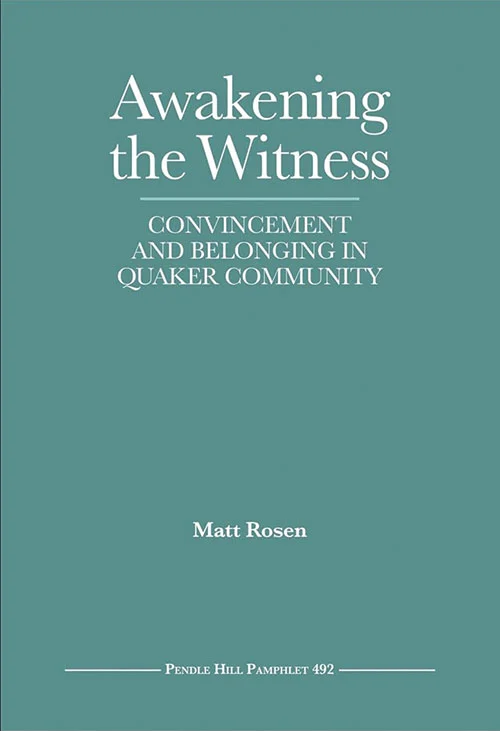
Awakening the Witness: Convincement and Belonging in Quaker Community
By Matt Rosen. Pendle Hill Pamphlets (number 492), 2025. 30 pages. $8.50/paperback; $7.50/eBook.
Matt Rosen’s engaging pamphlet, Awakening the Witness, explores the question “What makes someone a Quaker?” by examining early and contemporary Friends’ understanding of membership and convincement. The pamphlet is based on research he conducted while he was Pendle Hill’s 2023 Henry J. Cadbury Scholar. Rosen is a member of Stillwater Meeting in Barnsville, Ohio, part of Ohio Yearly Meeting, although he has lived much of his life in England.
Rosen begins by reminding us that membership in the Religious Society of Friends did not exist until decades after the Quaker movement began. George Fox, Margaret Fell, William Penn, and thousands of ordinary people sent to prison were not members of any religious organization. He gives two examples to illustrate this point: James Parnell and Elizabeth Fletcher became convinced Friends as teenagers and traveled in the ministry before each one died at age 19. No one would deny they were Quakers, but neither of them was a member of any religious organization.
Membership, Rosen notes, is a covenant relationship between an individual and a specific community in a specific place. For early Friends, this was not always practical; many traveled in the ministry; others were geographically scattered. Being a member of something was not essential to being a Quaker. Today, the opposite seems true: membership is seen as a formal act that is essential to being able to call oneself a Quaker. But he asks the provocative and challenging question: “If there were Quakers before membership why not Quakers outside of membership?” This brings him to the issue of convincement.
Early Friends saw convincement as one aspect of a three-phase process: conviction, convincement, and conversion. First comes the realization that one’s way of life needs to change as a result of the “awakening of a witness” within, a witness that “God has placed in every human heart . . . that testifies to God’s reality and living presence.” Such an awakening leads to the understanding that there is another way to live and that God is present within to guide us to that way. The result is not just a change in spiritual beliefs but a change into a whole new way of life. Rosen gives two examples of this process: first, his own. He was once a confirmed atheist but then unexpectedly began to feel that he was being “inexplicably held, cared for, and accompanied. I felt surrounded by an infinitely loving presence.” He became a convinced Friend, but it was years before he became a member. On the other hand, Ben Pink Dandelion was a member but “without any real sense of the Divine.” Some years later, while traveling across the United States, he “suddenly and unexpectedly . . . felt ‘held.’ Held by God.” He said that as a result he became “a religious Quaker.”
For early Friends, it was the evidence of these convincement experiences that brought them together to support one another in sustaining their commitment to follow God’s leadings. When membership came along, it was for practical reasons: recording marriages and births, noting who was in need of help, etc., not as the test of spiritual belief.
Rosen recognizes that the Religious Society of Friends exists today in a different context than in the seventeenth century. He accepts that there are many different reasons for becoming a member of a Quaker meeting and that all who join are likely to be enriched regardless of what has brought them there. He also accepts the fact that one can be a convinced Friend and not be in membership. In response to changing needs and attitudes, the structure of meetings and membership in the Society of Friends may change, but that is not something to worry about: “[A]ll people will be drawn to God in God’s good time—rescued, guided, and knit together by the Divine hand.”
This pamphlet is well worth reading by both those already in membership and those who are not. If you are a member, it will challenge you to think about why you are: to consider the nature of the covenant relationship between you and your meeting, and to consider the place of convincement in your spiritual life. For those who feel convinced but for one reason or another have not become a member, it provides reassurance (as it did for me) that it is still legitimate to consider yourself a Quaker and that convincement may eventually lead to a deeper engagement with a Quaker community.
John Andrew Gallery is an attender at Chestnut Hill Meeting in Philadelphia, Pa. He is the author of four Pendle Hill pamphlets and the recently published book, Alone with God: Spiritual Reflections and Essays, 2000–2024.
1 thought on “Awakening the Witness: Convincement and Belonging in Quaker Community”
Leave a Reply
Comments on Friendsjournal.org may be used in the Forum of the print magazine and may be edited for length and clarity.




Thank you! It was encouraging even to read this review. I experienced what I would call becoming a convinced Friend over a year ago, but there is no meeting closer than 70 miles away from where I live. I feel like it would violate the Quaker value of sustainability to travel that distance. But that is the only reason I haven’t joined a meeting.